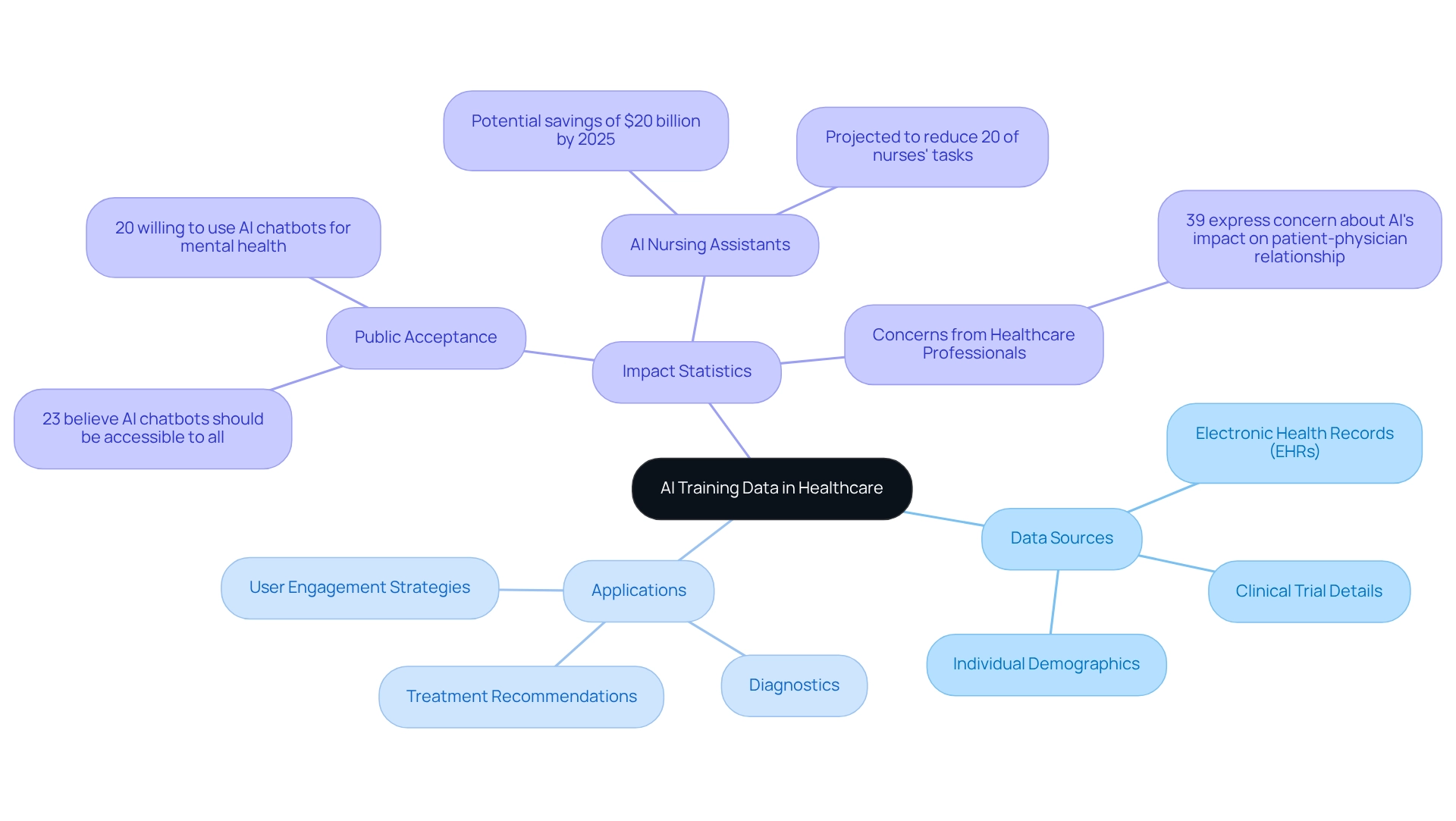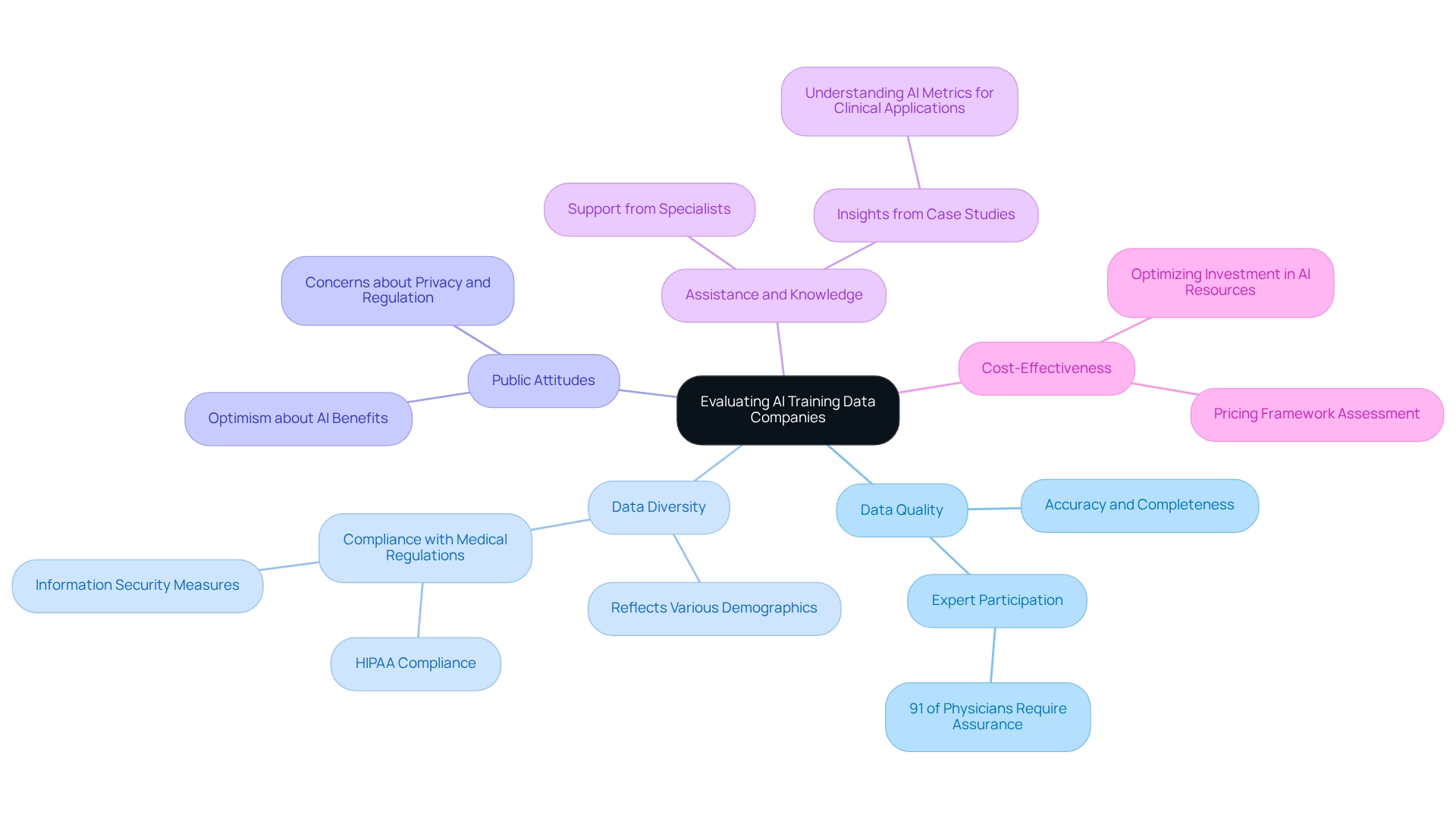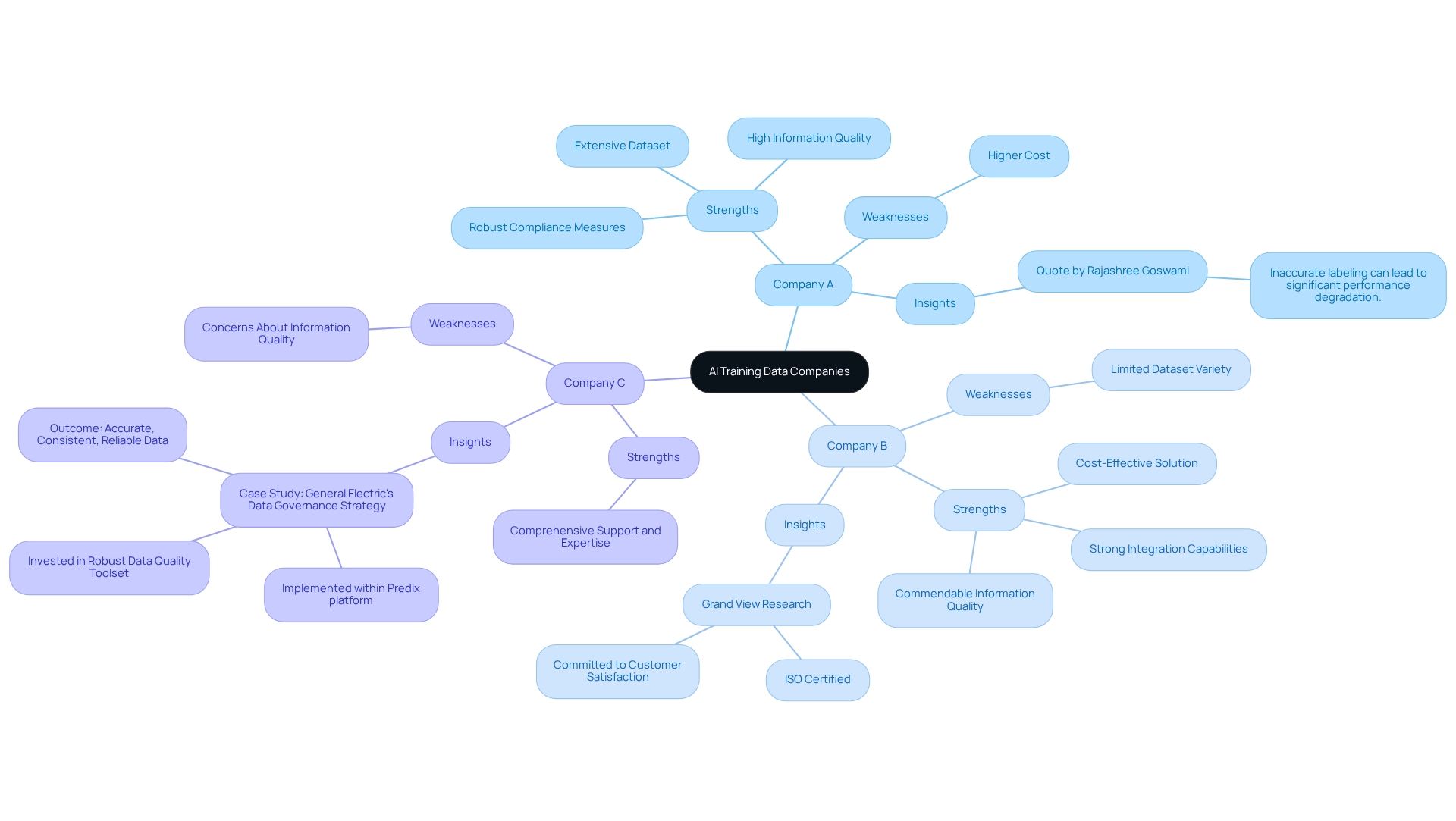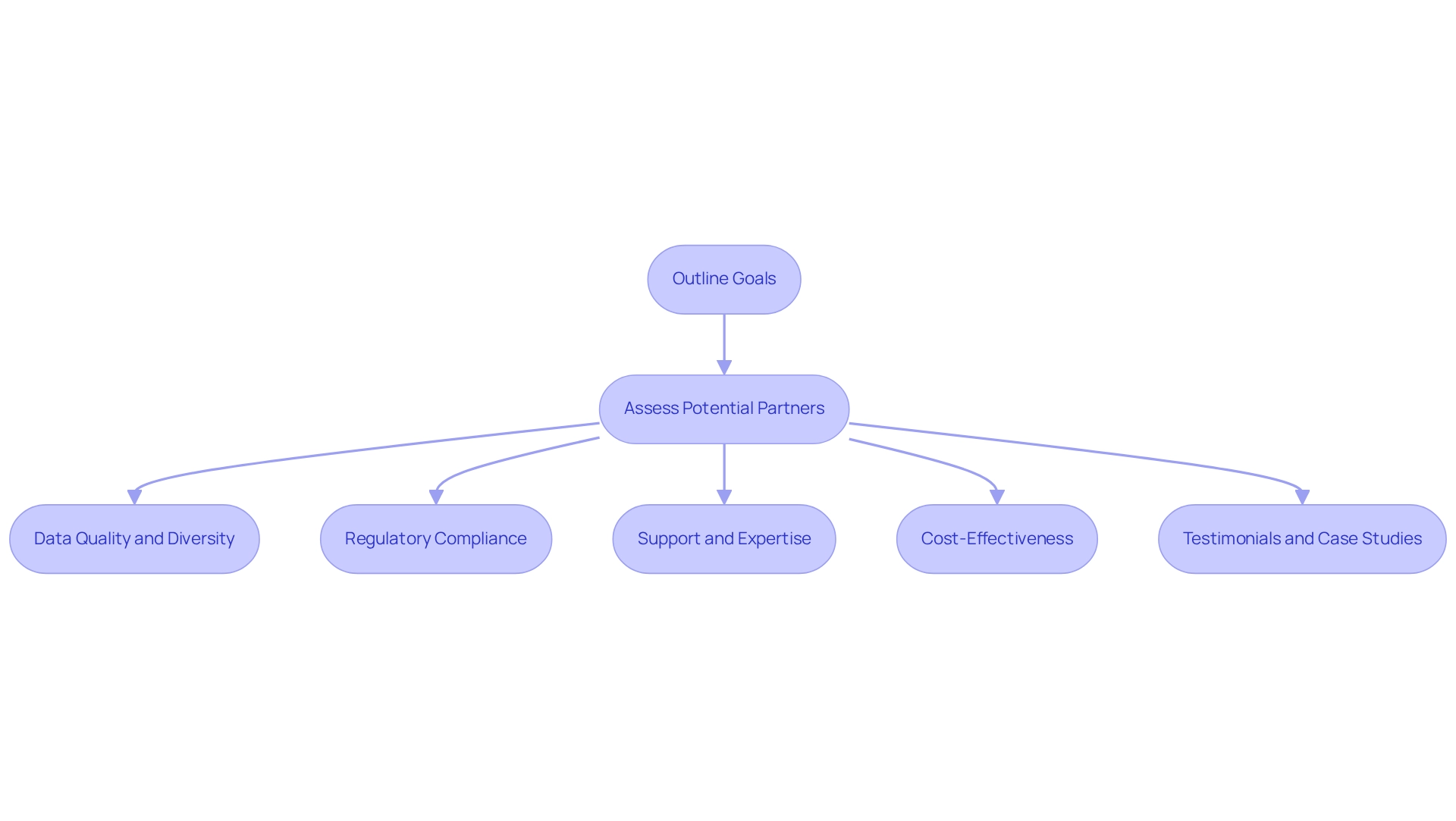Overview
The article presents a comprehensive comparative analysis of AI training data companies within the healthcare sector, underscoring the critical importance of data quality, diversity, and cost-effectiveness for the successful implementation of AI technologies. It articulates key criteria essential for evaluating these companies, while showcasing specific examples of leading firms in the field. Furthermore, it highlights the significant impact that high-quality datasets have on AI applications in healthcare, ultimately providing stakeholders with the necessary insights to make informed decisions.
Introduction
In the rapidly evolving landscape of healthcare, the integration of artificial intelligence (AI) is fundamentally reshaping the delivery and management of patient care. Central to this transformation is the concept of AI training data, which serves as the foundation for the machine learning models that drive predictive analytics and informed decision-making. This article delves into the significance of high-quality training datasets, exploring their profound impact on diagnostics, treatment recommendations, and patient engagement strategies.
With the emergence of innovative data science products and a growing acceptance of AI technologies among healthcare professionals and patients alike, understanding the criteria for evaluating AI training data companies is crucial. By examining leading providers and their unique offerings, stakeholders can make informed decisions that enhance patient care outcomes and operational efficiency in an increasingly data-driven industry.
Understanding AI Training Data in Healthcare
AI instructional information encompasses the collections utilized to educate machine learning models, enabling them to generate forecasts or choices based on input data. In the healthcare sector, this information includes:
- Electronic health records (EHRs)
- Clinical trial details
- Individual demographics
The quality and thoroughness of AI training data companies are paramount, as they significantly influence the accuracy of AI applications in:
- Diagnostics
- Treatment recommendations
- User engagement strategies
CareSet Systems has introduced innovative data science products that leverage insights from over 62 million Medicare beneficiaries and 6 million providers. These products feature advanced analytics tools designed to:
- Identify trends in prescribing behaviors
- Optimize treatment pathways
- Enhance health outcomes
For instance, well-organized datasets can reveal prescribing trends and treatment effectiveness, ultimately improving care for individuals. Recent data indicates that:
- 23% of U.S. adults believe AI chatbots should be accessible to everyone, including those not currently consulting a therapist, underscoring a growing acceptance of AI in medical services.
- 20% of U.S. adults express a willingness to utilize AI chatbots for mental health assistance, signaling a shift towards integrating AI solutions in care.
A notable case study in this realm is the AI nursing assistant market, projected to alleviate 20% of nurses’ maintenance tasks, potentially saving $20 billion annually by 2025. This reduction allows nurses to concentrate more on patient care, thereby enhancing overall medical service delivery.
Expert opinions underscore the essential nature of high-quality data provided by AI training data companies for AI development. Concerns have been raised regarding AI’s impact on the patient-physician relationship, with 39% of medical professionals voicing apprehension about how AI might affect personal care. This sentiment reinforces the necessity for robust and reliable datasets provided by AI training data companies to ensure that AI applications enhance rather than hinder user interactions.
In summary, understanding the intricacies of AI development data is critical for stakeholders in the healthcare sector. As they strive to leverage AI technologies for improved patient care and operational efficiency, prioritizing data quality will be vital in determining successful outcomes.

Criteria for Evaluating AI Training Data Companies
When evaluating AI training data companies, it is essential to prioritize several key criteria:
- Data Quality: The accuracy, completeness, and relevance of datasets are of utmost importance. High-quality information is essential for effective training in AI training data companies, as it directly influences the reliability of outcomes. Significantly, 91% of physicians seek confirmation that generative AI materials are produced by medical professionals prior to utilizing them, emphasizing the necessity of expert participation in guaranteeing information quality, a concern for AI training data companies.
- Data Diversity: A diverse dataset that reflects various demographics and clinical scenarios significantly enhances the robustness of AI models. This diversity is essential for creating solutions that are relevant across various groups of individuals, and AI training data companies must ensure compliance with medical regulations, such as HIPAA, while implementing stringent information security measures to safeguard patient details.
- Public Attitudes: Public attitudes towards AI reflect optimism about its potential benefits, but also concerns about privacy and regulation. This compliance is vital for maintaining trust and integrity in AI applications, which is particularly important for AI training data companies, as the ability to seamlessly integrate with existing healthcare systems and workflows is essential for the practical application of AI solutions. Effective integration ensures that AI tools provided by AI training data companies can be utilized without disrupting established processes.
- Assistance and Knowledge: The degree of support offered by the company, including access to specialists who can help in information interpretation and AI implementation, is essential. This support can enhance the effectiveness of AI solutions in clinical settings. Insights from case studies, such as ‘Understanding AI Metrics for Clinical Applications,’ emphasize the need for tailored evaluation metrics for customized AI models in specialized medical domains, highlighting the role of AI training data companies in providing relevant data.
- Cost-Effectiveness: Assessing the pricing framework and overall worth in relation to the quality of information and services provided by AI training data companies is essential for making informed choices. Cost-effectiveness guarantees that organizations can optimize their investment in AI learning resources, which includes evaluating AI training data companies in the healthcare industry, ensuring that stakeholders can choose providers that satisfy their particular requirements and improve care outcomes.

Comparative Analysis of Leading AI Training Data Companies
In this comparative analysis, we delve into three leading AI training data companies: Company A, Company B, and Company C.
Company A stands out for its extensive dataset, which encompasses diverse patient demographics and treatment histories. Its strengths lie in high information quality and robust compliance measures. However, it may present a higher cost compared to its competitors. The importance of information quality is underscored by Rajashree Goswami, who asserts, “Incorrect labeling can lead to substantial performance decline, even with large collections of information.”
Company B provides a cost-effective solution with a strong emphasis on integration capabilities. While it offers commendable information quality, its dataset variety is somewhat limited, potentially affecting the robustness of AI models. Grand View Research, an ISO-certified entity committed to customer satisfaction and quality service, highlights the critical nature of trustworthy information sources in this context.
Company C excels in delivering comprehensive support and expertise, making it an ideal choice for organizations new to AI. However, some client reviews have raised questions regarding its information quality. A relevant case study is General Electric’s information governance strategy, which illustrates how investing in robust quality management can enhance AI initiatives and ensure precise, consistent information for real-time insights.
This comparative analysis elucidates the unique offerings of each company, specifically highlighting AI training data companies, enabling stakeholders to evaluate their options based on specific needs and priorities. As the AI dataset market evolves, with North America projected to hold a significant share of 35.8% in 2024 and Canada emerging as the fastest-growing regional market expected to reach USD 124.6 million by 2030, understanding these distinctions becomes increasingly essential for effective machine learning applications in medical care.

Choosing the Right AI Training Data Partner for Healthcare
Selecting the right AI training data companies partner is crucial for healthcare organizations aiming to leverage artificial intelligence effectively. Start by clearly outlining your goals: Are you focused on increasing engagement, improving treatment outcomes, or optimizing operations? This clarity will guide your evaluation process.
Next, assess potential partners based on several key criteria:
- Data Quality and Diversity: Ensure that the datasets offered are comprehensive and representative of the patient population you serve. High-quality information provided by AI training data companies is essential for developing efficient AI models. CareSet’s extensive analysis of Medicare information provides valuable insights into drug usage and treatment pathways, significantly enhancing the quality of datasets for AI training data companies.
- Regulatory Compliance: Verify that the partner adheres to healthcare regulations, ensuring that information handling practices meet industry standards.
- Support and Expertise: Evaluate the level of support provided, particularly if your organization is new to AI technologies. A partner with robust expertise, like CareSet, can facilitate smoother implementation and integration, especially with their monthly Medicare updates that improve provider engagement and address critical business questions.
- Cost-Effectiveness: Analyze the pricing structure in relation to the value delivered. A cost-effective solution should not compromise on data quality or support.
- Testimonials and Case Studies: Seek feedback from similar organizations that have successfully partnered with the data provider. For instance, CareSet has demonstrated its ability to identify 15% more targets and 250% more patients than leading claims vendors, showcasing its effectiveness in the market. The U.S. market for generative AI in medical services, valued at $1.07 billion in 2022, is expected to surpass $10 billion by 2028, indicating the increasing confidence in AI solutions among medical professionals. Moreover, 75.7% of radiologists have confidence in the results delivered by AI-driven algorithms, further endorsing the efficacy of AI in medical services.
By adhering to these steps, medical stakeholders can make informed choices that align with their strategic objectives. With 83% of physicians believing AI could address many challenges in the medical field, the right partnership, such as with CareSet, can significantly enhance productivity and patient outcomes, ultimately driving innovation in the sector. Notably, AI can boost productivity for healthcare staff, with call centers reporting a 15-30% increase in efficiency.
Stay in the Know with Our Latest News and Blogs: Engage with CareSet to access the latest insights and updates that can empower your organization in navigating the complexities of healthcare data.

Conclusion
The integration of artificial intelligence in healthcare is revolutionizing patient care, with AI training data serving as the cornerstone of this transformation. High-quality datasets, encompassing diverse patient demographics and clinical scenarios, are essential for the effective training of AI models. The accuracy and comprehensiveness of these datasets directly impact diagnostics, treatment recommendations, and patient engagement strategies, ultimately enhancing healthcare outcomes. Companies like CareSet Systems exemplify the potential of leveraging extensive Medicare data to drive significant improvements in treatment pathways and patient engagement.
When evaluating AI training data providers, healthcare organizations must prioritize:
- Data quality
- Diversity
- Compliance
- Integration capabilities
- Support
- Cost-effectiveness
These criteria ensure that stakeholders can select partners that align with their specific needs and enhance patient care. A comparative analysis of leading companies highlights the importance of understanding each provider’s unique strengths and weaknesses, facilitating informed decision-making in an increasingly competitive market.
As the healthcare sector continues to embrace AI technologies, the potential benefits are immense. With a growing acceptance of AI tools among healthcare professionals and patients alike, the emphasis on high-quality training data will be vital in shaping successful AI applications. By forging strategic partnerships and focusing on robust datasets, healthcare organizations can not only improve operational efficiency but also significantly enhance patient care outcomes, paving the way for a more innovative and effective healthcare landscape.


